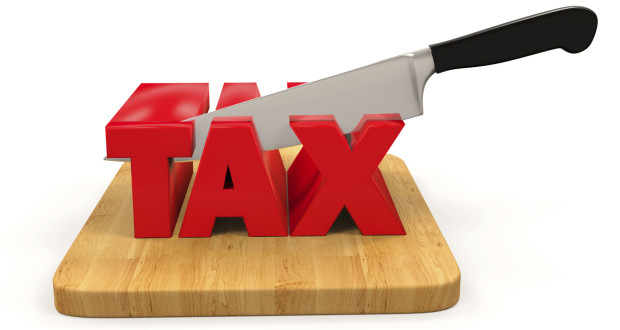The Fight over “Tax Reform”
Tax Cut Concept
Republicans have long since dreamed over “Tax Reform,” or what I call robbery. Republicans are currently aiming to slash taxes to unbelievably low levels. Republicans will try to cut corporate tax to 20-25% from the current 35%, income tax to 10-25% (depending on income level), and totally get rid of estate tax. There are plans to get rid of some minor deductions, but that wouldn’t come close to filling the hole this will leave in the budget. Republicans are basically planning to gut revenues and increasing loopholes. There was at one point a plan to cut loopholes, but the opposite seems more likely. This fight isn’t for “tax reform,” it’s for tax cuts for corporations and the wealthiest individuals. Loopholes already make it so many corporations pay nothing and others can pay as low as 12% in corporate taxes, but the new lowering along with an increase in loopholes will make corporate tax a shell of its former self. In the way these tax cuts are structured, it seems that the U.S. national debt is going to new heights.
The debate over tax cuts is almost nonexistent in Congress. The debate is not over if tax cuts should happen, it’s about how much can be cut. President Trump would say corporate taxes should be cut to an unbelievable 17% (with more loopholes) while congressional Republicans would say 25% is enough. In reality, the 17% is most likely a way for the president to negotiate with congressional Democrats so he can go with the 25% figure. Tax cuts are not just a Republican issue, Democrats seem to favor them as well, since President Obama actually made President Bush’s tax cuts permanent. Tax cuts are definitely going to be passed in the Senate, while debate will be a little fiercer in the House where many Representatives are going to have to juggle 2 policy positions, that they are deficit hawks and that they want tax cuts. Tax cuts will likely be the death blow to the Republican party and might cripple the Democrats for their participation, since they may lead to a debt problem worse than Japan’s and a potential default of the debt since trickle-down economics has never worked before. The only way these tax cuts may not happen is if President Trump himself goes against his own party which isn’t very likely since he still hasn’t gotten what he wanted from Congress, and the Republican party is his last line of defense in case any political upheaval occurs. The debate over tax cuts may be delayed due to Republican desire for the repeal of Obamacare, and the base’s desire to sort immigration out once and for all, but tax cuts will definitely be voted on this year to satisfy donors.
Tax cuts have already had a heavy impact on the U.S., and by looking back at history we can see what sort of impact Trumps tax cuts will have. Reagan’s tax cuts had an extremely negative impact on the U.S.. Due to Reagan’s tax cuts the tax burden shifted from the richest Americans to the poorest Americans while the income of the poor fell. The belief that cutting taxes on large corporations and the rich will create jobs in completely false since job creation began to slow down after Reagan’s presidency. During Reagan’s presidency job growth stabilized due to the end of the OPEC crisis, but the U.S. began to lose jobs soon after until Clinton’s presidency which saw an internet boom.
Just like how the tax burden was shifted during Reagan’s presidency, Trump may put the burden on the ever shrinking middle class. The shift of the tax burden would cause the economy to contract since people would have a lot less spending money, and government (the biggest contributor to the economy) would be crippled. The upcoming tax cuts which will most like pass this year will cripple the U.S., and possibly drag the nation into a depression due to an incredibly large debt- which will inevitably lead to bankruptcy. These tax cuts may finally destroy trickle-down economics in the eyes of Americans, since this time, the economy will be pushed off the edge.











